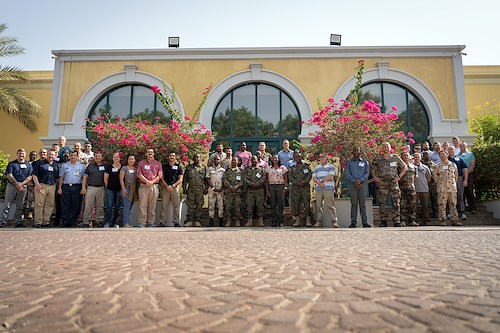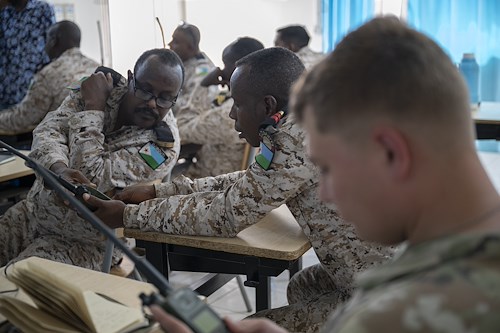Gallery contains 8 images
×
Photo 1 of 8
Partnership and collaboration emphasized at Logistics in East Africa Forum
Participants of the Logistics in East Africa Forum including partner nation representatives and Combined Joint Task Force Horn of Africa staff, stand for a group photo in front of the Djibouti Palace Kempinski, July 19, 2023. Representatives from Djibouti, Spain, Japan, Kenya, South Korea, Italy, France, and the U.S. attended the forum. (Department of Defense photo by U.S. Air Force Staff Sgt. Dylan Gentile)
Photo by: CJTF-HOA Public Affairs
Photo 2 of 8
Mass Communications Specialist
Representatives from the Djibouti Armed Forces attend the Logistics in East Africa Forum in Djibouti
City, Djibouti, July 19, 2023. The representatives took notes and networked with other logisticians
during the forum. (Department of Defense photo by U.S. Air Force Tech. Sgt. Bradley Tipton)
Photo by: U.S. Air Force Tech. Sgt. Bradle
Photo 3 of 8
Partnership and collaboration emphasized at Logistics in East Africa Forum
U.S. Army Maj. Gen. Jami Shawley, Combined Joint Task Force - Horn of Africa commanding general, speaks with partners at the Logistics in East Africa Forum at the Djibouti Kempinski Palace, Djibouti, July 19, 2023. Shawley spoke on the importance of coordination between partners during a crisis response event. (Department of Defense photo by U.S. Air Force Staff Sgt. Dylan Gentile)
Photo by: CJTF-HOA Public Affairs
Photo 4 of 8
Partnership and collaboration emphasized at Logistics in East Africa Forum
A Djibouti Armed Forces member speaks with an Italian Armed Forces member at the Logistics in East Africa Forum at the Djibouti Kempinski Palace, Djibouti, July 19, 2023. The forum enabled logisticians to network and share information with local partners. (Department of Defense photo by U.S. Air Force Staff Sgt. Dylan Gentile)
Photo by: CJTF-HOA Public Affairs
Photo 5 of 8
Partnership and collaboration emphasized at Logistics in East Africa Forum
A representative from the Kenya Defence Forces speaks at the Logistics in East Africa Forum in at the Djibouti Kempinski Palace, Djibouti, July 19, 2023. Partner nations brought up concerns and solutions surrounding sustainability on military bases and in operations. (Department of Defense photo by U.S. Air Force Staff Sgt. Dylan Gentile)
Photo by: CJTF-HOA Public Affairs
Photo 6 of 8
Partnership and collaboration emphasized at Logistics in East Africa Forum
Lt. Col. Kenichi Otsubo, Japan’s Deployment Support Group for Counter-Piracy Enforcement chief of staff, speaks during the Logistics in East Africa Forum at the Djibouti Kempinski Palace, Djibouti, July 19, 2023. Partner nations conducted an analysis of their logistical coordination during the forum. (Department of Defense photo by U.S. Air Force Staff Sgt. Dylan Gentile)
Photo by: CJTF-HOA Public Affairs
Photo 7 of 8
Partnership and collaboration emphasized at Logistics in East Africa Forum
U.S. Army Maj. Gen. Jami Shawley, Combined Joint Task Force - Horn of Africa commanding general, speaks to CJTF-HOA staff and partner nation representatives during the Logistics in East Africa Forum at the Djibouti Kempinski Palace, Djibouti, July 19, 2023. Shawley discussed how critical coordinated logistics efforts are to crisis response and other operational missions. (Department of Defense photo by U.S. Air Force Staff Sgt. Dylan Gentile)
Photo by: CJTF-HOA Public Affairs
Photo 8 of 8
Partnership and collaboration emphasized at Logistics in East Africa Forum
U.S. Army Col. Antionette Mulholland, Combined Joint Task Force – Horn of Africa J4 director, speaks at the Logistics in East Africa Forum at the Djibouti Kempinski Palace, Djibouti, July 19, 2023. Logisticians at the forum discussed how to enhance collaboration with a focus on long-term mission sustainment in the Horn of Africa. (Department of Defense photo by U.S. Air Force Staff Sgt. Dylan Gentile)
Photo by: CJTF-HOA Public Affairs
DJIBOUTI -- Moving resources and people across a continent as large as Africa takes extensive planning and coordination between countries. With a focus on long-term sustainment in the region, Combined Joint Task Force - Horn of Africa (CJTF-HOA) and U.S. partner nations came together to discuss the details at the Logistics in East Africa Forum, July 19, 2023.
LEAF stakeholders discussed access, agreements, resources, personnel and other factors surrounding logistics in East Africa. Military representatives from Djibouti, Spain, Japan, Kenya, South Korea, Italy, France, and the U.S. came together to network and bolster relationships between entities operating logistical programs for their respective countries.
“This is a great opportunity for us to bring together subject matter experts and key stakeholders,” said U.S. Navy Cmdr. Jim Burns, Camp Lemonnier supply officer. “The focus here is to strengthen partnerships and build a better future in East Africa through cooperation and best practices.”
Military operations in East Africa rely on a network of partnerships and agreements between shareholders promoting stability in the region. Partner nations negotiate with resources and manpower. Although military personnel rotate throughout Djibouti, the LEAF provides continuity in these relationships and bolsters communication between logistics professionals.
“Camp Lemonnier is a strategic logistics and distribution hub in East Africa,” said Burns. “Being in the same room for this forum helps to build rapport between us and our partner logisticians for information sharing and problem solving.”
These relationships can lead to collaboration between partners and CJTF-HOA during training events, exercises, and humanitarian missions. The multi-national environment creates pathways to agreements that aim to optimize resource-use in a region where resources are limited.
“The key has always been understanding where everybody is and what their needs are,” said U.S. Army Col. Antionette Mulholland, Combined Joint Task Force - Horn of Africa J4 director. “We can’t do this by ourselves, every single one of us in this footprint has shortfalls and limitations. However, just because I have a constraint or limitation, doesn’t mean you do.”
Minimizing consumption of these resources, finding alternative energy sources, and reducing the overall environmental footprint was a key talking point at LEAF. Logistics professionals discussed how to do more with less through agreements and partnerships, to share resources while developing infrastructure, and to ensure a sustainment of presence on the African continent. They talked through the importance of smart management of energy and water in an area where it could be scarce.
Logistics managers use Acquisition and Cross-Servicing Agreements to cement resource-sharing between the North Atlantic Treaty Organization and coalition countries. These agreements create a contractual backing to obligate participating parties into long-term cooperation. These agreements build continuity between military deployment cycles and ensures host countries of a long-term presence and coordination.
Participants spoke about their ACSA programs and how to use them to optimize relationships between stakeholders as well as contractors.
“ACSA agreements are vital to how we sustain ourselves on the continent,” said Mulholland. “[Reciprocal relationships] allow us to plan for our long term goals and mission, and these agreements set up the perfect framework to do that.”
Another key topic during LEAF was the ongoing crisis in Sudan. Participating nations used the initial wave of evacuations of their embassies and citizens as a standard to measure their logistical strengths and weaknesses. Multiple participants showcased an analysis of where they could have improved their response through collaboration with their partners.
U.S. Army Maj. Gen. Jami Shawley, CJTF-HOA commanding general, emphasized how the evacuations from Sudan not only showcased the U.S. commitment to their allies in times of crisis, but how a coordinated response with partner nations could yield greater results than numerous independent operations.
“The ongoing crisis emphasized the importance of a robust, resilient logistics capability and working with our allies and partners through a multi-national coordination,” said Shawley. “Those efforts saved lives, showing to me that logistics are absolutely crucial for our success no matter what the operation.”
Military diplomacy happened one briefing and one handshake at a time throughout the remainder of LEAF, showcasing how logisticians in the U.S. military and partner nations continue to build relationships and allow people and resources to move effectively across the continent of Africa.




























